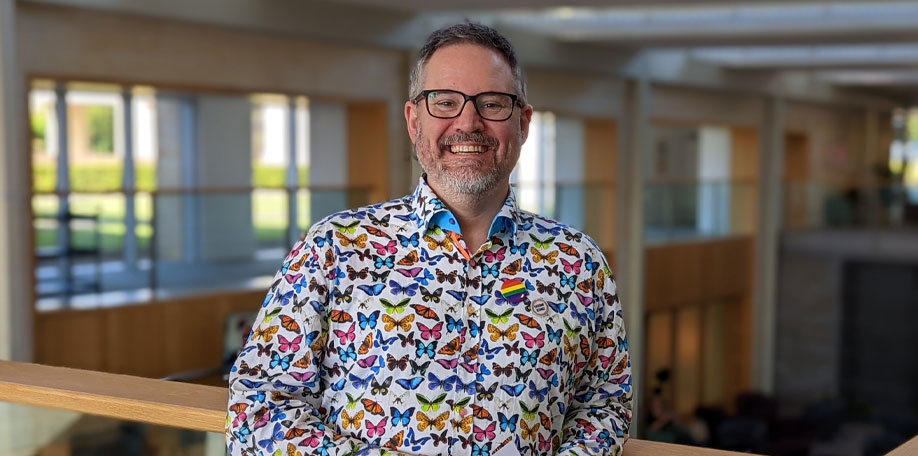National Coming Out Day – Why am I “out” at work?
National Coming Out Day is an important day for everyone in the LGBTQ+ community, many of whom would have had (or still have) worries about facing discrimination, judgement or bullying at some stage in their lives. It aims to inspire those who are still ‘in the closet’ to hopefully come out and be their true, authentic selves around family, friends and colleagues.
We caught up with our Office Services Team Leader, Ed Woodman-Evans, about their coming out journey in the workplace.

Why am I “out” at work?
There are many answers to this question. We talk about bringing our authentic selves to work, about a diverse workforce being a creative workforce, about valuing different experiences. All these answers, and many more, are valid. Everyone will give you a different answer.
The answer I want to give here is: being in the closet is exhausting.
Constantly worrying about how I’m acting, what I’m saying, what if somebody figures it out, what if someone suspects, what if, what if – if I put all my energy into hiding this part of who I am, how much energy do I have left to put into my work? If I’m constantly worrying at work, can I ever be happy at work?
Being out at work means I don’t have to edit or censor myself. I can just be me, which can be very liberating. And it’s not just better for me; I sincerely hope being out and visibly queer at work might encourage other people to bring their authentic self to work.
I’ve been out at work for almost two decades across multiple employers and it has generally been a positive experience. In the early days of being out there was, perhaps, a comment here, an insult there; but since the introduction of the Equality Act 2010 it really has been an entirely positive experience.
No one can tell you how to come out because it’s a personal journey; and coming out is a process, not an event. Every time LGBTQ+ people start a new job, meet new people, find ourselves in a new situation, we have to decide whether to reveal this part of ourselves, or keep it hidden. Once you’ve decided where to be out, you have to figure out how to be out.
Sometimes the only way to do it is the big announcement: take a deep breath and say to the person you’ve known for ages, “I’m gay”, only to find they either already knew or aren’t at all bothered and the whole thing becomes terribly anti-climactic. The other option is to slip casual remarks into conversation. I find this a lot easier being married – any kind of ‘getting to know you’ conversation usually has an opening for a “my husband…” comment, which does the job nicely. But there are other ways if that isn’t an option, like making a LGBTQ+ pop culture reference, or referencing the past: “when I first realised I was…”.
While thinking about what I wanted to say in this piece, something occurred to me that I hadn’t really thought about before: the friendships I have because I’m out.
RuPaul says “as queer people we get to choose our family”. Armistead Maupin talks about how we have our biological family and our ‘logical family’. Whatever you call it, we all have some kind of found family, a chosen family, a group with whom we share the deepest friendship without fear of judgment. These connections are only possible when we don’t hide part of ourselves from others.
Something my logical family has done for me is give me space to talk about and explore my gender identity. I’ve always been uncomfortable with masculinity and have always tried to qualify or modify terminology to better suit me: I’m a queer man, a gay man, but never just a man. Through many conversations with my logical family (and, I must admit, watching an episode of RuPaul’s Drag Race UK where Ginny and Bimini were discussing their own experience of gender) I came to the realisation that I am non-binary. I’m not a man after all, so I don’t need to tie myself in cognitive knots trying to define a masculinity that isn’t mine.
I came out at work, at Wessex Water, as non-binary in 2021. Being out at work about my gender identity has helped me to better understand it and identify with and embrace terms such as ‘genderqueer’ and ‘demi-male’. I’ve found easier ways to describe my gender identity succinctly through the conversations had as part of the coming out process: My body may be male, but my gender is not.
I’ve found the process of coming out as non-binary at work isn’t quite as simple as coming out as gay (but I haven’t been doing it for nearly as long). One way I do it is by including my pronouns – they/he – in my email signature. This does a lot of the work for me, but also continues the work of being visibly queer, letting other LGBTQ+ people know it is ok to be out at work.
So why am I out at work? So I don’t have to hide this part of myself from my colleagues. So I can put all my energy at work into work. But also, because being out at work as a gay non-binary person is validating and liberating. I am much more confident being out and, therefore, much happier. That is why I am out at work.

